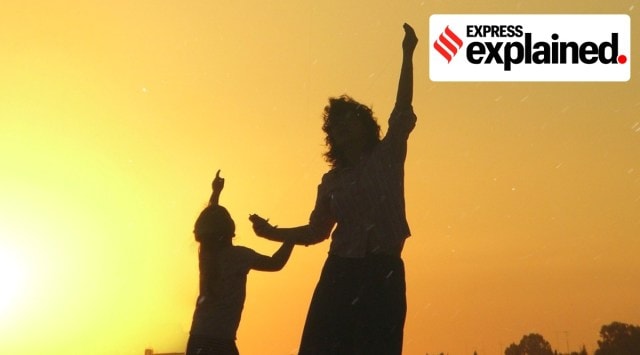This Quote Means: ‘The hand that rocks the cradle is the hand that rules the world’
The quote had come as an essay prompt question in UPSC-CSE Mains examination in 2021. On this Mothers’ Day, we take a look at the quote, its origins, and how to crack it for UPSC preparation.
 The phrase is most often used in a positive context, to underline how women can bring about events that will influence generations, by paying adequate attention to how their children are raised. (Photo via Pixabay)
The phrase is most often used in a positive context, to underline how women can bring about events that will influence generations, by paying adequate attention to how their children are raised. (Photo via Pixabay) The title of English poet William Ross Wallace’s poem ‘The Hand That Rocks the Cradle is the Hand that Rules the World’ has become a stand-in proverb to demonstrate the power of motherhood and how it can bring about sweeping changes across generations.
The quote had come as an essay prompt question in the UPSC-CSE Mains examination in 2021. On this Mothers’ Day, we take a look at the quote, its origins, and how to crack it for UPSC preparation.
What is the full quote and where does it come from?
“For the hand that rocks the cradle// Is the hand that rules the world,” is the refrain in Wallace’s poem, and also its title. Even though the poem, first published in 1865, is rarely remembered today, the refrain itself has become a popular way of highlighting the impact of motherhood.
The poem goes:
Mothers first to guide the streamlets,
From them souls unresting grow—
Grow on for the good or evil,
Sunshine streamed or evil hurled,
For the hand that rocks the cradle
Is the hand that rules the world.
The line’s near-universal imagery of a ‘hand rocking the cradle’, an act which soothes and comforts an infant, is a simple yet powerful method of evoking mother figures in the minds of readers or listeners. The next line, which is almost the opposite of the first in its grandness (‘the hand that rules the world’) connects maternal intimacy to a state of power that can change the world itself.
What does the quote mean?
Simply put, the quote says that women have great power in influencing the future, because they have a dominant role in the bringing up of children from infancy itself.
The phrase is most often used in a positive context, to underline how women can bring about events that will influence generations, by paying adequate attention to how their children are raised. A mother’s influence extends from a child’s daily routine to their value systems; thus, her impact can last beyond her lifetime.
However, the quote can also be criticised on the grounds that it seems to put the entire onus of bringing up children on mothers, especially when it comes to negative qualities of a child being blamed on their upbringing, leading to questions on how the mother played a role in it. Also, it seems to promote the idea that women can have influence over events outside the domestic sphere only through their roles as mothers, that is, indirectly.
Where and how should the quote be used?
Although a very popular quote, the phrase does not enjoy everyday use, probably due to its grandiose nature. It can be used to illustrate the importance of mothers, the necessity of spreading awareness about correct ways to raise children, and to create awareness about best practices concerning the health and well-being of children.
Uses in media
Ironically, the phrase ‘The hand that rocks the cradle is the hand that rules the world’ has long outlasted the poem of the same name. At least two American films are titled The Hand that Rocks the Cradle: a silent movie from 1917, and a thriller from 1992.
It is also the title of at least three popular songs. The popular British band The Smiths had a song called ‘The Hand That Rocks the Cradle’ in their debut album The Smiths in 1984. American country musicians Glen Campbell and Steve Wariner recorded a song with the same name in 1987. In 1994, the English rock band Black Sabbath released a song called ‘The Hand that Rocks the Cradle’ in their 1994 album Cross Purposes.
Similar quotes
A few quotes which also highlight the significant role played by mothers in society:
1. “Only mothers can think of the future because they give birth to it in their children”: This quote is commonly attributed to Russian writer and political thinker Maxim Gorky.
2. “A mother is not a person to lean on, but a person to make leaning unnecessary”: American social activist Dorothy Canfield Fisher is most often credited as the author of this quote.
- 01
- 02
- 03
- 04
- 05





































